You’ve probably seen every type of trailer there is but would have no clue which one you need if the moment arose to purchase or rent one. Trailers are one of those things that you can’t really tell what it does without a little research. Maybe you need to haul dirt or possibly a new car, or you’re moving out of your home. Whatever the reason, our guide will walk you through several of the most common trailers available and how each one will help you accomplish a specific task.
Things to Consider
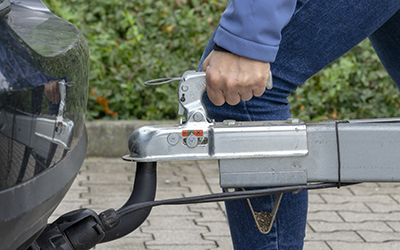
When identifying which specific trailer you want to purchase, there are a handful of things to consider outside of the type of trailer you need.
Maximum Weight Being Towed
Even if you settle on a specific trailer type, each trailer of that type isn’t made the same; there are different sizes with different weight capacities. If you purchase a trailer that isn’t capable of handling the weight load, it puts strain on your towing vehicle and the trailer itself. Look for a trailer with a payload capacity higher than anything you plan on hauling.
Towing Capacity of Your Truck
You’ve ensured your trailer can handle the weight of your cargo, but your truck needs to be able to handle towing the heavy load. Putting too much strain on your towing vehicle can burn out your transmission. Modifications can be made to your transmission to reduce the strain put on it, but that can be costly.
Ball and Hitch Class
There are several different kinds of hitches out there, and they all have different ratings classifying the total weight they can handle.
Hitch Weight Classes:
- Class I – Up to 2,000 lbs.
- Class II – Up to 3,500 lbs.
- Class III – Up to 5,000 lbs.
- Class IV – Up to 10,000 lbs.
- Anything above 10,000 lbs requires a heavier duty hitch, such as a pintle, gooseneck, or fifth-wheel hitch. These types of hitches will allow up to 25,000 pounds. Fifth-wheel hitches are commonly used with campers or recreational vehicles.
Purpose of the Trailer
The last step is determining what the trailer will primarily be hauling. This will help narrow down your search so you can find the ideal trailer for your needs. If you plan on hauling many different types of equipment, you may need to purchase multiple trailers. Some trailers are more versatile and allow you to haul many things, but there might not be a trailer that hauls everything you want. Ultimately there are two main categories of trailers, flatbed and enclosed, with subcategories within them. A third common trailer is a dump trailer.
Flatbed Trailers
Flatbed trailers are the most common types of trailers you’ll find and offer several different varieties to tackle almost any hauling situation. Just like their name implies, their basic design is a flatbed with a ball hitch, and they’re open-air, which means the cargo on the trailer is susceptible to the weather. That design is why they’re the most common style because they’re the most versatile and can hall many different things, and they’re the easiest to use. A standard flatbed trailer usually doesn’t have any sides. They come in many different styles, including drop deck, equipment, utility, tilt bed, and gooseneck.
Possibly the most common type of trailer, utility trailers are the simplest design and are meant for hauling smaller pieces of equipment, such as snowmobiles, ATVs, or smaller lawn equipment. A utility trailer usually has guard rails around the sides as well to keep cargo contained and a ramp to easily unload wheeled vehicles and equipment.
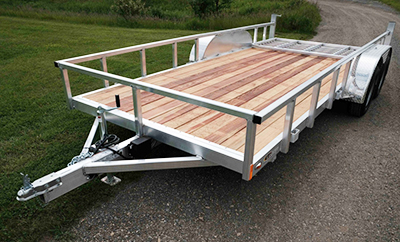
An equipment trailer is very similar to a utility trailer but features a sturdier frame for hauling heavier loads, such as skid steers or larger construction equipment. Most of these types of trailers have heavy-duty tie-downs, hardwood plank floors, and winches for hauling heavy equipment, such as small tractors and even automobiles. Variations of these are tilt-bed and gooseneck trailers.
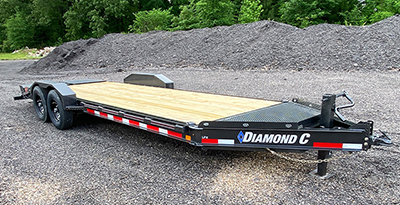
Landscape Trailers
These generally look similar to a utility trailer but have features specifically for landscaping. They usually have racks for holding shovels, rakes, and other hand tools and are built to accommodate lawn mowers and other larger landscaping equipment. Landscape trailers typically have tailgates that can double as ramps so equipment can easily be loaded and unloaded.
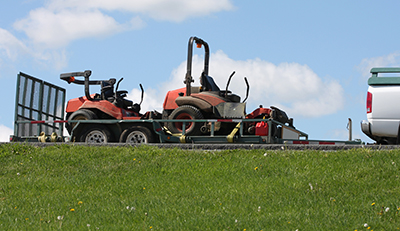
A drop deck trailer, also known as a step-deck or lowboy trailer, has all the features of a flatbed trailer, but the actual deck is lower to the ground. This design is to accommodate taller cargo that exceeds the maximum legal height limit if hauled on a regular flatbed trailer. A drop deck trailer cuts out the need for permits while hauling taller cargo. Some drop deck trailers feature a hydraulic system that actually lowers the entire bed to the ground making it easier to load and unload cargo.
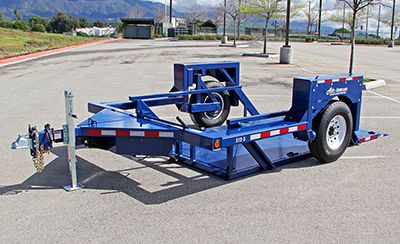
A tilt-bed trailer features a mechanism that allows the bed to tilt upward to meet the ground, making it easier to unload cargo. The tilting ramp also makes it easier to drive vehicles and other large equipment onto the trailer. The tilt mechanism is commonly found on equipment and dump trailers.
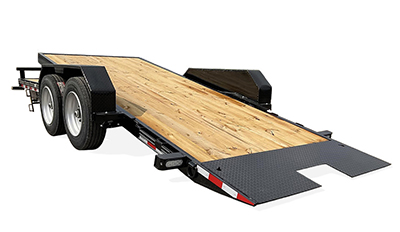
Gooseneck trailers are for heavy-duty equipment, such as payloaders or backhoes. These trailers are capable of handling loads weighing tens of thousands of pounds over long distances. Instead of being towed from the bumper, a gooseneck trailer is installed in the truck bed with a hitch ball. This shifts the trailer’s weight to the truck’s rear axle and improves handling and maneuverability.
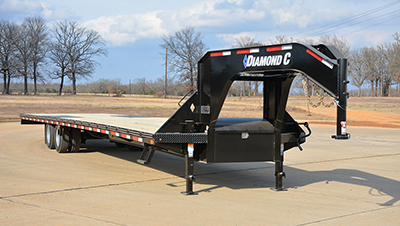
Enclosed Trailers
Enclosed trailers, also called cargo trailers, are aptly named because the trailer bed is fully enclosed. They usually have four walls, rear double doors, and a sideman door for easy access. Some enclosed trailers have lighting inside them, making them ideal for mobile workstations or tool storage. Enclosed trailers are ideal for hauling cargo that you may need to leave unattended because they can be locked. Being enclosed also makes them great at resisting the weather if your cargo needs to sit for a prolonged period.
An automobile-enclosed trailer is very similar to a standard enclosed trailer but features a door that pulls down to make a ramp. The ramp makes it easy to load and unload the vehicle. Being enclosed also ensures debris doesn’t come in contact with the vehicle.
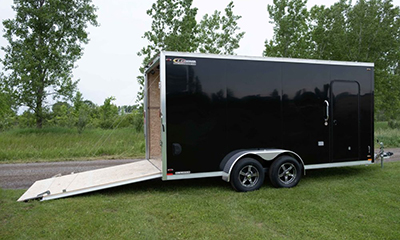
An enclosed drop deck trailer works similar to a utility drop deck trailer with the added benefit of an enclosure. The entire deck lowering to the ground makes it easy to load and unload any cargo with less stress on your body.
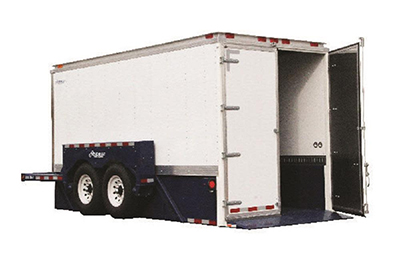
Dump Trailers
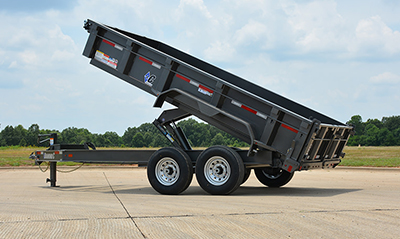
A dump trailer is built with a heavier-duty frame in order to support the loads it’s usually hauling. These trailers are typically used to haul dirt, gravel, or other types of landscaping materials. Most dump trailers also feature a roll-down tarp to keep the elements away from loaded materials and prevent them from blowing away during transport.
Shop all of your trailer needs from some of the top brands including Diamond C, Legend Premium Trailers, Doolittle Trailer Mfg, and more at Acme Tools.

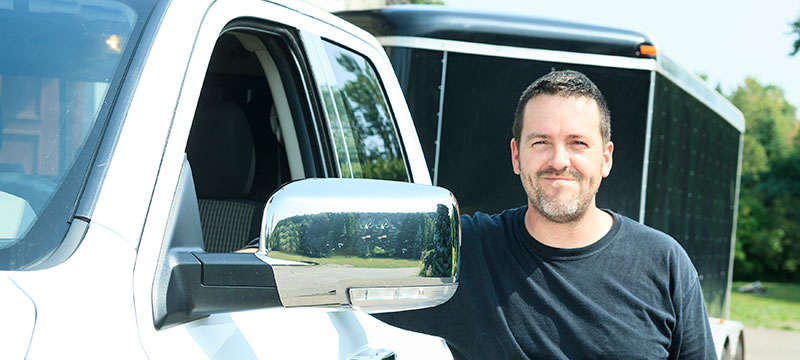
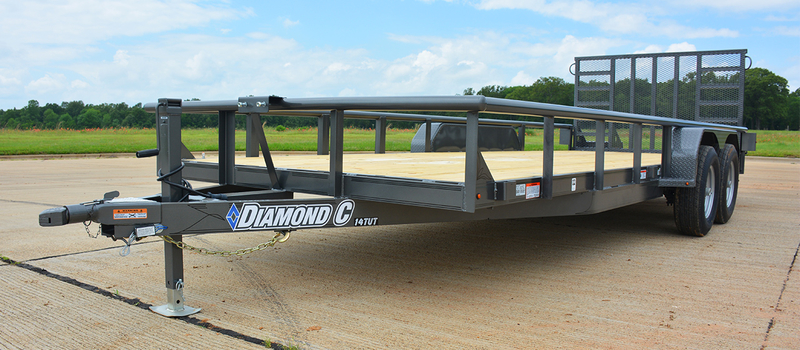
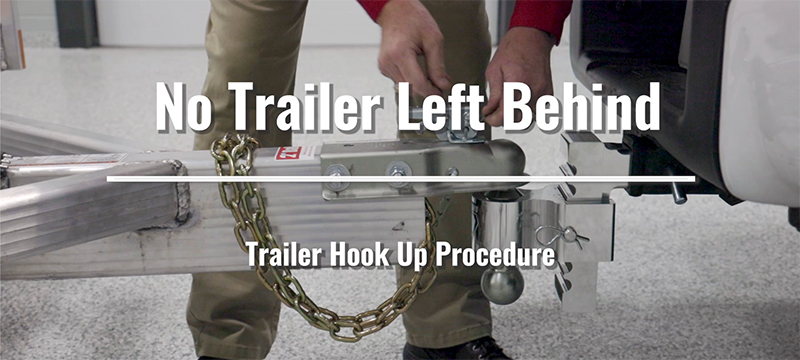
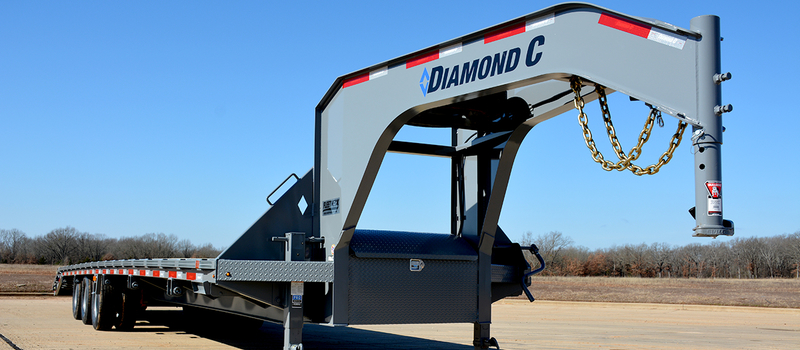
One Comment
Olivia Smart
November 14, 2022 at 1:18 pmThank you for explaining that enclosed trailers are great for hauling cargo. My husband was telling me that he’s thinking about getting a trailer for our family. It seems like it could be great for when we go on camping trips and other things as a family.